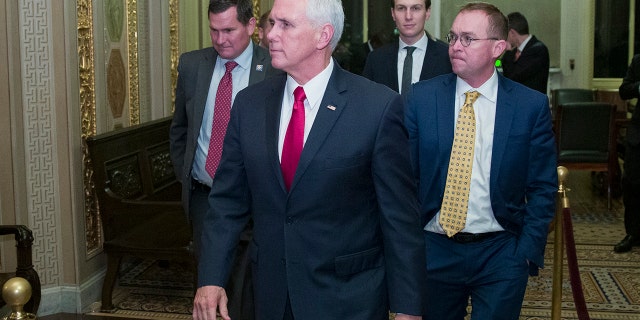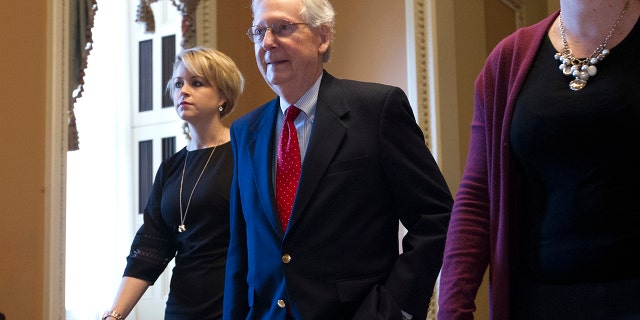Funding for a slew of federal agencies lapsed at midnight after Congress and the White House failed to pass a spending package amid a bruising fight over border wall funding.
The missed deadline means nine of 15 Cabinet-level departments and dozens of agencies will close just as the Christmas break begins. But it does not mean the whole federal government is affected: Only about a quarter of the government is actually shutting down.
The Senate planned to reconvene at noon Saturday to continue talks.
Congress had been facing a Friday deadline to fund a portion of the government or risk the partial shutdown. But even though negotiations continue, lawmakers left the Capitol on Friday without a deal to fund the government by midnight’s deadline.
Over the last few weeks, Republicans and Democrats had been at a standstill over the president’s demands for $5 billion to fund the border wall.
“This is our only chance that we’ll ever have, in our opinion, because of the world and the way it breaks out, to get great border security,” President Trump said earlier Friday. Democrats will take control of the House on Jan. 3, and they oppose major funding for wall construction.
“This is our only chance that we’ll ever have, in our opinion, because of the world and the way it breaks out, to get great border security.”
Much of the drama Friday took place in the Senate: After keeping the vote open for five hours to secure enough support, the Senate finally advanced a House-approved spending bill with $5.7 billion for a border wall, after Vice President Mike Pence went to the Capitol to break a tie.

Vice President Mike Pence, second from left, with White House senior adviser Jared Kushner, and incoming White House Chief of Staff Mick Mulvaney as they depart for the night without a bill that would pay for President Trump’s border wall and avert a partial government shutdown, on Capitol Hill, Friday, Dec. 21, 2018 in Washington. (Associated Press)
That procedural hurdle paves the way for a future final vote in the Senate.
But with a 60-vote threshold, the House-passed package stands little chance of being endorsed on the Senate side.
Republicans, who will soon lose control of the House, see the spending fight as their last chance to secure funding for Trump’s long-promised border wall. Democrats have blasted the wall as unnecessary, expensive and offensive.
Earlier in the week, the Senate passed a bill funding other agencies at current levels through Feb. 8. But the president said he would not sign that bill because it didn’t include new wall funding.
After the White House initially indicated a willingness to consider such a short-term compromise measure, Trump faced mounting pressure from immigration-focused conservatives to dig in on his demand for $5 billion to fund a border wall. The wall was, indeed, a signature campaign promise.
The House then approved $5.7 billion for a border wall as part of a measure to fund the government through early February.
Both sides have been busy assigning blame. While Schumer and House Minority Leader Nancy Pelosi have already branded this outcome a “Trump shutdown,” the president tweeted Friday that “it will be a Democrat Shutdown!” if they don’t support border wall funding.
Congress may have time to work out a deal before really affecting some workers: Because the partial government shutdown comes during the Christmas break, some government workers weren’t planning to work over the next four days anyway.
According to a precedent set during the Reagan administration, federal workers can be exempt from furloughs if their jobs are related to national security or if they perform essential activities that “protect life and property.”

Senate Majority Leader Mitch McConnell, R-Ky., returns to the Capitol from the White House as work to avoid a partial government shutdown continued with President Trump demanding funds for a wall along the U.S.-Mexico border, at the Capitol in Washington, Friday, Dec. 21, 2018. (Associated Press)
The Cabinet-level departments closing are Agriculture, Commerce, Homeland Security, Housing and Urban Development, Interior, Justice, State, Transportation and Treasury.
But essential personnel are still required to work without pay. Nearly 90 percent of the Homeland Security staff is deemed essential.
The U.S. Postal Service (USPS) will remain open as usual during a partial government shutdown because it is “an independent entity that is funded through the sale of our products and services, and not by tax dollars,” a spokesman told Fox News.
Transportation Security Administration (TSA) agents, air traffic controllers and border security agents would also be required to work through a shutdown – though they might not get a paycheck right away.
Amtrak, a government-owned corporation, will also continue with normal operations during a short-term shutdown, a spokeswoman confirmed to Fox News.
Fox News’ Kaitlyn Schallhorn and the Associated Press contributed to this report.



Comments